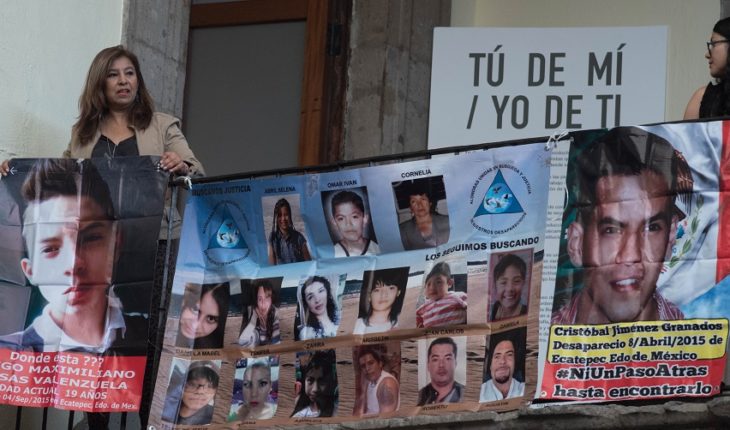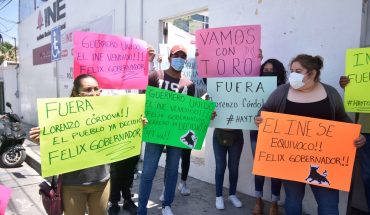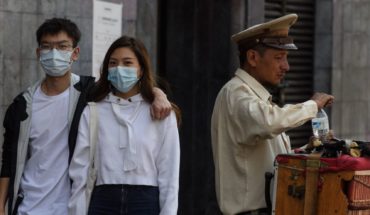The new government said the search for missing persons would be a priority. In January he launched a new call to renew the ownership of the National Commission of Search for Persons (CNB) and in March armed an event in National Palace for the “reinstallation” of the National search system. There, President Andrés Manuel López Obrador Even assured that “there is no budget limit” to find those who do not appear, and what is saved from the austerity plan would go to that cause.
However, in the first quarter of the year, the CNB did not have a single-peso expense record.
Groups of victims believe that the issue is slow and, despite some progress of the National Commission, which this Monday meets 100 days of operation with its new commissioner, Karla Quintana, no tangible results are yet seen.
They applaud that there seems to be a greater linkage between institutions that must address the problem, and that 11 states have already joined in installing or creating the decree for their Local commission of search, with respect to the only 8 that had done it last six. But they point out that the main obstacle that CNB had in its first stage a year ago was still facing: the lack of access to the budget.
Grace Mahogany Fernandez, of forces unit for our disappeared in Mexico (FUNDEM) and member of the Citizen Council of the National Search system, says that in early April members of the Commission said that just that fortnight would be able to start Charge. For this reason, although the Commissioner has attended numerous search operations, they have been organized by the social organizations themselves or local prosecutors, and not by the Commission.
“The support of the executive has it, already on at least two occasions the president has said that it is the priority of his Government; However we see that it does not yet permeate the institutions. This is nothing more than the search Commission, the prosecution and the governorate; It involves more institutions that do not have as a priority the issue of missing, one of which is the Treasury, which does not provide the Commission with bureaucratic procedures that allow the exercise of the budget it needs so much. So without money, then how do you hire people, buy equipment, move? Work is difficult, “he laments.
The budget of expenditures of the Federation (PEF) 2019 assigned to the search for missing persons 400 million of pesos. They are 69 million less than what was supposed to be allocated in 2018, although then only 1.4% were exerted.
For commission operation, this year 193,215,472 pesos were labelled. But the federal spending advances available so far, January, February, and March, are in zeros, including the workers ‘ pay item.
The Commission worked last year only with eventual staff and its structure was not defined. Finally, it was 43, but according to the activists, this squad is still in the middle.
“What follows exactly the same (as in the previous administration) is the exercise of the resource. That is, how to demand that they go to do searches, operatives, if nothing else is just over 20 people, of which maybe 10 are administrative, “says Fernandez.
The other 207,576,512 pesos budgeted are to distribute in subsidies to the federal entities through their local commissions of search. But the possibility of using this money did not exist in the first three months of the year, since the guidelines to grant it were published until March 27 in the Official Gazette of the Federation (DOF).
Local Commissions: The biggest advance, but with reservations
The most important thing that has been achieved, for the relatives of the disappeared, is that it accelerated the conformation of local commissions of search (CLB). Last year there were only eight states that already had it installed: Coahuila, State of Mexico, Guerrero, Jalisco, Nayarit, Nuevo León, San Luis Potosí and Queretaro.
They have joined 11 with the decree of creation or are in process of installation: Baja California, Campeche, Colima, Chihuahua, Durango, Hidalgo, Sinaloa, Tamaulipas, Tlaxcala, Zacatecas and Veracruz, although in the latter state the holder lasted two months and resigned the Last Wednesday, arguing personal health issues.
“Unfortunately we resigned. And he gave us all over the tower, because we were already working, and then again the process, again all of zero… It is tiring, “says Lucía Díaz, of the Solecito Collective of Veracruz.
At the national level, he considered, they also started from zero, because the previous one “was a blank space”.
Each time his group asked for help to cross fingerprints or go out to do a field search, he ran out of response, so it was a lost year. Now, on the other hand, it sees much more proximity, especially with the collectives, and more articulation with state instances.
“We are still in stages where it is not enough to be tangible, with budgets for example. It is still tripped over, but has been present in many points nationwide, in different searches. I think he’s doing a much closer job, he says.
Josefina de León, of the network of disappeared in Tamaulipas, also perceives greater collaboration. Last month they had a meeting in which the Commissioner raised a regional search strategy, originally thinking of Coahuila, Nuevo León and Tamaulipas, although the local groups proposed, because of the dynamics they have seen firsthand in the Disappearances, that the region would be extended to the area of the Huasteca of the north of San Luis Potosí and Veracruz, a proposal that was collected and so it was agreed.
“We see a commission that is taking a turn, in the sense of doing something more tangible… A number of strategies had already been implemented that built the same families, for many years, at first with the previous administration of Roberto Cabrera, and now we see that it continues advancing. The only thing is that well, are processes that are too slow, we would like to accelerate a little more, and start giving results, which is what families want, “says De León.
The representative in Mexico of the United Nations High Commissioner for Human Rights (UN-DH), Jan Jarab, applauds the change in the Government’s attitude to the problem: in the previous six-term, he says, only the Under-Secretary of Human Rights, Roberto Campa, gave An impulse to the subject, while in the rest of the government was perceived a mixture of simulation and denial, so that the CNB only existed in a formal way.
The relaunch, with Quintana in command, was actually the launch, but the slope now, in his view, is that actually operate the local commissions, which are necessary to form the national search system, which without them, remains incomplete.
“A search system is needed at the level of the federal entities. Several have not created a State commission of search, and several others have done but with a single official, sometimes a very committed and very good officer, but lacks human resources, lacks financial resources, does not even have office… Then it becomes an impossible mission. It is very important to insist that the federal entities have to do it seriously, says Jarab.
Records and protocols to do
One of the obligations marked by the enforced Disappearance Act, published in November 2017, is that an approved search protocol should be created, without which the implementation of the law remains incomplete. In the past administration only one draft was made; In this, just a couple of weeks ago there was a meeting to analyze the subject, but just reviewed the index, according to some attendees, so the progress is minimal.
José Ugalde, of the collective Justicia Querétaro, points out that in addition to not having released the budget for the search for missing, it is still not clear how it will work.
“I think the subject, the National search Commissioner knows it very well, but has not given results for lack of budget, organization, squares, workers,” he says.
“It still does not settle, at 100 days, well the way of working as it should be. The Commission lacks the protocol, how it will start, that we do not know how the participation of the families will be to carry it out. ”
In Queretaro, the local commission has already advanced to issue its own search protocol, when the national has not yet been, which disconcerted the families.
For Lucy Diaz, of Veracruz, the earrings that most urgently resolve are the records of missing and unidentified bodies, as either are pending or are not reliable.
On 14 May, the Under-Secretary of Human Rights, Alejandro Encinas, presented at the National Palace the first record of clandestine graves found from this year in the country. But on the existing missing record, which accounts for 40180 people, said it would have to be done again because the methodology used to integrate it is not reliable.
There is also no certainty that there are 26000 bodies unidentified in the country’s forensics, as published Political Animal Last week. The law mandates to create a national registry of deceased and unidentified people, but there is not a first attempt, besides that it will not depend on the CNB, but the attorney General’s office (FGR), of which the families have not seen disposition.
Grace Fernandez says that Quintana has taken a big step in establishing dialogue with the Prosecutor’s office specializing in investigation of the crimes of enforced disappearance, by Abel Galván, but that the attorney general, Alejandro Gertz, has ignored the issue of Missing and still has not received anyone to talk about it.
Josefina de León, of the network of disappeared in Tamaulipas, also sees improvement in the act of the CNB, for example, in trying to do things in a way more methodOenological, as in having presented the report that accounts for the finding of 222 clandestine graves this year.
However, he expresses his doubts about the figures, since Tamaulipas only reported two sites of pits with two bodies, when the seekers of that state, says, locate at least four places where they have found remains this year, included in the water and not buried , so it could be a difference of definition in what to consider a clandestine deposit of bodies.
“We want the time to see more tangible issues, that is to say, locations of more people, in every way. We know, we are aware that many died, but we also know from experience that we can find people alive. Then we want that moment of results to come. Families are what they want, results, “he demands.
“It’s on track. Slow, but it’s on track. ”
Thank you for reading! Help us get on with our work. How? Now you can subscribe to the political Animal on Facebook. With your monthly donation you will receive special content. Find out how to subscribe here. Check out our list of frequently asked questions here.
translated from Spanish: Collectives criticize slow progress in search of missing
May 20, 2019 |





